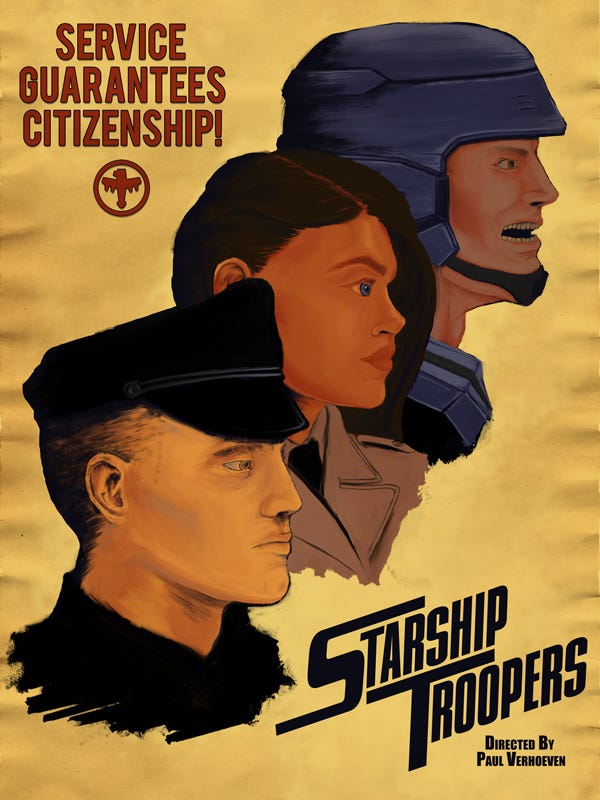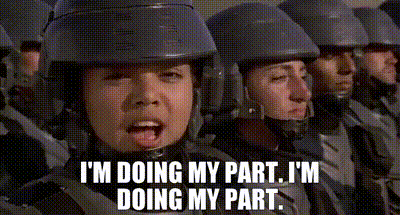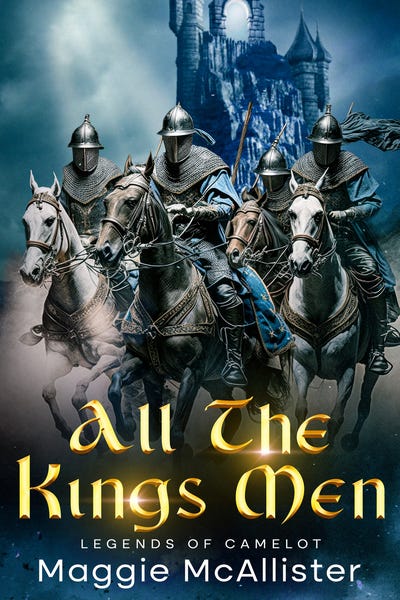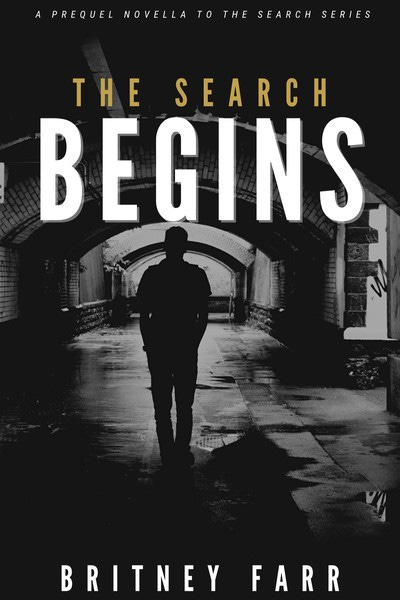Starship Troopers Through Veterans' Eyes
Some Reasons Why GWOT Warriors Love the Book and Film
Join Intelligence Officer Brendan Sean Murphy as he voyages into space in a struggle for peace and his own sanity. My first novel Fallen is available for $0.99 digital and $14.99 on paperback.
Starship Troopers Gives a Chaotic World Order
The Starship Troopers Arc
Back in 1997, a hyped action movie opened to unimpressive reviews. I remember seeing it in the theaters with my father. While the action scenes were fun, young me found the movie lighter than cotton candy. The one thing that struck me was the talk about how the Terran Federation was fascist. However, after a few days, the movie faded into a distant memory.
Twenty-seven years later, Isaac Young’s X thread on how Starship Troopers failed as a parody blew up on the social media site once known as Twitter. I recommend reading the thread, but the jest of it is that despite the director’s desire to equate the human side with Nazi Germany, the choices made make the viewer even more sympathetic to the humans.
Like most things on the internet, the thread spun out of control as people argued over whether liking the film's portrayal of human society in the movie was an act of embracing fascism (meaning authoritarian government).
Many defended the movie, including those who had once written it off. Global War on Terrorism veterans and others who served in varying capacities were among the film's fiercest defenders. To understand why, one needs to know the context of Starship Troopers and the experiences of those who served.
Context of the Book and Movie
The Book’s Universe is One of Freedom and Being Valued for Serving Society
“Have you read the book?” is the question anyone deployed is asked when they mention Starship Troopers. While not all book lovers like the movie, every deployee I have talked to who liked the movie praised the book.
The world depicted in the book is a beacon of hope. It’s a place where everyone, regardless of their status of civilian (never served) or citizen (has served), have fundamental rights to live and work in society without coercion. People can own businesses and live wherever they desire, be it as citizens or civilians. The protagonist’s civilian father, Emilio Rico, is a testament to this freedom, being a successful business owner with government contracts. The book paints a clear picture of a permissive society for those who choose not to serve.
“Service grants citizenship” means those who do serve earn the voting franchise and access to specific jobs like policemen. Service is voluntary, and one can only be denied the chance to enlist if they lack enough mental competence to understand the service oath. It means that even if someone is paralyzed, the Federation will find a suitable civil job for them. As the book states, “I asked one of the doctors what percentage of the victims flunked the physical. He looked startled. “Why, we never fail anyone. The law doesn’t permit us to.”
The book presents a service-based enfranchised society that values the warfighter while blessing all with freedom. This is not an authoritarian government.
The Movie Fails to Portray Either Fascism or National Socialism, Instead Showing an Attractive, Ordered World (Except for Pro-Lifers)
As Isaac Young noted, the movie fails to show the world of Starship Troopers as a bad place. The locales are beautiful, crime is punished, voting is a thing, and people who aren’t citizens can live in luxurious homes. There is no racism or sexism shown in the very mixed society, thus ruling out a national socialist regime. Additionally, there is no indication of a corporatist system of syndicates that would indicate a fascist government. Some commentary will say the Arachnid attack was a false flag and the Federation is authoritarian, but nothing in the original movie gives evidence of this.

(Note: Starship Troopers 3: Marauder has the Federation being authoritarian, but that movie is a horrible film few have watched, so it’s outside our consideration).
The infamous shower scene states getting a license for bearing children is horrifying from a pro-life perspective. That line is the one substantive sign that something is horribly awry in the Starship Troopers cosmos to pro-lifers, but many veterans have mentioned this line doesn’t affect their overall love of the movie. Other things, such as Nazi-inspired uniforms and posters, do a great job of creating an authoritarian atmosphere, but director Paul Verhoeven fails to provide substance to back up the message he wanted to give.
So Why Do Veterans Love the Book and Movie?
Because it is better than what those who deployed experienced.
Purpose: The 9/11 terrorist attacks needed to be answered. In little more than six months, the international coalition destroyed the Taliban regime and devastated the al Qaeda organization. It was a just war. Then, a smaller coalition invaded Iraq for the stated reason of dismantling the country’s weapons of mass destruction, and it was hinted Baghdad may have had a hand in 9/11.
Both wars were successes. Then, new wars grew out of the so-called accomplished missions. Iraq saw regime elements, al Qaeda, and Shia rise up not to greet the incoming soldiers but in insurgencies. Soldiers fought because they were told they were keeping America safe and preserving democracy. The results were the rise of the Islamic State, Iranian-aligned militias turning Iraq into another Lebanon, and American leaders nodding as the Iranian-aligned politicians stole the 2010 Iraqi parliamentary election from the Sunni and secular Shia Iraqi National Movement. Meanwhile, the war in Afghanistan morphed made the coalition the protector of one of the most corrupt and fraudulent governments in the world.
Unlike the men and women of the Mobile Infantry, those deployed had no clear cause to fight for as the wars dragged on.
Accountability: The Battle of Klandathu was a wake-up call in Starship Troopers. In the book, the commander of the operation, General Diennes, realized the battle was lost. So, he engaged in a suicide mission to buy time for others to escape. Meanwhile, the film had Sky Marshall Dienes resign, taking responsibility for the disaster. On top of that, the book and movie emphasized the importance of officers and NCOs looking out for their men.
Two leaders were fired during the Afghan War. International Security Assistance Force commander General David McKiernan was fired for stating that the war was not going well, according to the Afghanistan Papers. His replacement, General Stanley McChrystal, committed the ultimate military sin of badmouthing civilian leadership and was forced out.
All the other commanders avoided making their bosses look bad while reporting that the war was going positively. This rosy picture painting allowed generals to float through their terms while avoiding punishments for things like leaking classified and having an affair with a biographer (David Petraeus) or having a relationship with a foreign-born “activist” who owned a military consulting firm and served as honorary consul for another country (John Allen). Interesting side note: General James Mattis made that “activist” an honorary ambassador for CENTCOM.
Guns Go Brrrr: A major attraction is the film’s 1980s-style cheesy action featuring a group of friends fighting for their lives. It’s escapism, much more so than the book’s political philosophy. Ultimately, the popcorn nature of the film blends with the unintended messages of a military and world many yearned for. It’s something those who served can watch repeatedly, each time escaping to a universe of never ending friendships, a just war giving purpose, accountable leaders, and a country that values them. “That’s something we never got, Patrick,” one veteran told me.
Other Independent Book Promotions
99 Cents Fantasy and Book Sale
All the King's Men: Legends of Camelot by Maggie McAllister - Free Book
Forbidden love and seductive intrigues intertwine in "Camelot's Echo: The Once and Future King,"
where the pursuit of the Holy Grail becomes entangled with the clandestine love affair between Sir Lancelot and Queen Guinevere. As their passion casts shadows over Camelot's splendor, a war erupts, leading to the illicit seizure of the throne by the cunning Sir Mordred.
The kingdom, once radiant, crumbles in a final, devastating battle. Mortally wounded, King Arthur succumbs to an enchanted sleep on Avalon's shores, leaving behind the promise of a prophesied return — a poignant legacy echoing with the forbidden love and seductive allure that shaped the destiny of Camelot.
Full of adventure, romance and magical wizardry.
The Search Begins by Britney Farr - Free Book
All alone in an increasingly hostile world, Amina and her brother Aiden are safe in their little bunker underground. That is until a new law is put into effect, forcing every law-abiding citizen to receive a mark and conform to the new world religion. Do so or risk the consequences. Logically, the choice is easy, but morally Amina knows it’s wrong. Taking this mark would mean denying her faith, and that’s not an option.
After seeking out help, Amina and her brother discover a coded message that could be the answer they’re looking for. Now they must quickly decode the message or risk losing their freedom forever.
Until Next Time
Thank you for reading this newsletter post. Next time, I will interview a Ukrainian steampunk comic book creator. Then, I will give a coda to the Religion and Aliens series by taking a look at the argument of "Aliens are Demons" from a Christian perspective (See the previous posts on Catholicism, Eastern Orthodoxy, Protestantism and Other Christian Faiths, Islam Judaism, the Dharma faiths, the ancient faiths, Theozoology and World Ice Theory, Native American religions, and the Nation of Islam, Scientology, and Falun Gong post for more).
As always, please leave a comment with any questions, reviews, thoughts, whatever about Fallen, Risen, or whatever else I have discussed. I promise to reply!





